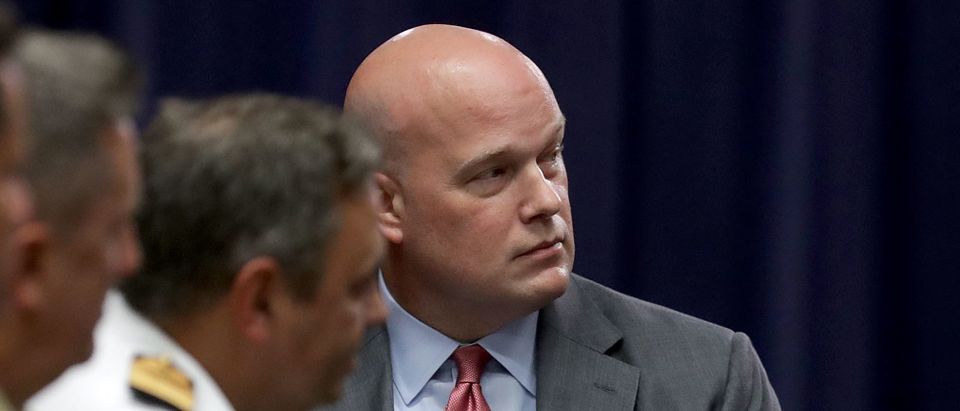There appears to be no limit to the amount of legal analysis and Monday morning quarterbacking regarding President Trump’s controversial promotion of Matthew Whitaker — formerly chief of staff to Attorney General Jeff Sessions — to the interim position of acting attorney general.
Whitaker, a former federal prosecutor and one-time media contributor, has seemingly come out of nowhere to launch himself into a temporary position of considerable authority, including oversight of the Mueller probe. Media reports and scholarly op-eds have clashed over whether Trump’s elevation of Whitaker is a slow-motion “Saturday Night Massacre” in the making, or merely a futile power move by a president grappling with an investigation beyond his reach.
All these things considered, president’s actions likely only pose a realistic threat to the Mueller probe in terms of the amount of information the American public ultimately learns about its finding.
Let’s dispense with a critical legal housekeeping matter first. Whitaker was elevated to his position without the trouble of Senate confirmation in reliance upon an “interim appointment” provision in the Federal Vacancies Reform Act of 1998 (VRA). The provision is limited in the permissible duration of such an appointment — no more than 210 days — and the range of individuals who can qualify for such an appointment — namely, current government officials confirmed by the Senate or a senior official who has served in the same department for at least the prior 90 days. For the moment, Whitaker’s appointment falls within the permissible scope of those caveats.
Prominent lawyers — including Republicans such as George Conway, husband to senior White House advisor Kellyanne Conway — have expressed their view that the promotion is nonetheless illegal. The crux of their argument is premised on commentary by Justice Clarence Thomas in a concurring opinion to a 2017 Supreme Court case regarding whether the statutory provision itself runs afoul of the limits of the president’s Article II authority, namely the Appointments Clause, and should be set aside.
It may come to pass that Thomas’ commentary will eventually serve as the foundation for a ruling by the Supreme Court that finds this VRA provision unconstitutional. For the moment, no such ruling exists, and we can reasonably assume that it is more likely than not that the Whitaker appointment will stand.
The selection of Whitaker has raised concerns about the independence of the Justice Department, particularly with respect to the sanctity of the Mueller probe. The attorney general is nominated by the president, bringing ultimate control of the Justice Department under the president’s purview. Ever since the Nixon era and the trauma of Watergate, it has nonetheless become an understood institutional norm that the Justice Department will operate with a functional level of separation from the political whims of the White House.
Whitaker’s public disdain for the Mueller probe itself, something he made clear during numerous media appearances before he joined the Trump administration, jeopardizes that independence. According to media reports, Whitaker also served as a de facto “mole” for the White House inside the Justice Department over the last few months. It is assumed that Whitaker will be far more likely to take steps to rein Mueller in with respect to sensitive topics, such as the president’s personal finances or a possible subpoena of the president himself.
The “investigation and indictment” train, however, has likely already left the station. The investigation into possible Russian collusion during the 2016 election is more than two years old. Hundreds of thousands of records have already been subpoenaed and reviewed by the FBI. Countless individuals have already been interviewed, and many more have also testified before Mueller’s grand jury. Numerous indictments have been issued, resulting in a host of guilty pleas, and it is expected that any remaining planned indictments will be coming out rather soon. If there was a chance to cripple Mueller’s probe before it could get its footing and uncover critical information, that time has long since passed.
The only realistic threat Whitaker conceivably poses concerns Mueller’s eventual report. Under existing agency regulations, it is not a requirement that the special counsel report ever see the light of the day. That report will be presented by Mueller to Whitaker, as the acting attorney general, and it will be up to Whitaker to determine whether any part of the report is made public (as well as possibly referred to Congress for possible impeachment proceedings).
If Whitaker is the White House’s attack dog, as many fear, it is possible he might try to bury the most embarrassing parts of the report in so much as they concern President Trump and his family. That would raise the specter of Congress — and, more importantly, the American public — being deprived of relevant information as we begin the march toward the 2020 election cycle.
And that, more than anything else, is precisely why the president picked Mr. Whitaker.
Bradley P. Moss (@BradMossEsq) is a partner at the Washington, D.C. Law Office of Mark S. Zaid, P.C., where he has represented countless individuals (including whistleblowers) serving within the intelligence community, and is also the deputy executive director of the James Madison Project, through which he has represented media outlets such as Politico, Gawker, Daily Caller, and the Daily Beast in FOIA lawsuits against the Bush, Obama and Trump administrations.
The views and opinions expressed in this commentary are those of the author and do not reflect the official position of The Daily Caller.












